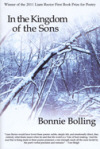In the Kingdom of the Sons
Bonnie Bolling’s collection In the Kingdom of the Sons, winner of the 2011 Liam Rector First Book Prize for Poetry selected by Tom Sleigh, is a sensual work from a distinctly female perspective, exploring topics of motherhood, sexuality and domesticity, and how these aspects of being a woman interplay.
Bonnie Bolling’s collection In the Kingdom of the Sons, winner of the 2011 Liam Rector First Book Prize for Poetry selected by Tom Sleigh, is a sensual work from a distinctly female perspective, exploring topics of motherhood, sexuality and domesticity, and how these aspects of being a woman interplay.
“Unliving” describes a mother’s overwhelming, claustrophobic, feeling of being practically and physically needed by her family. She moves “swiftly” and “proficiently,” “peeling potatoes, / killing ants on the countertop” or “remembering to love” her husband, all the while having one of her children sick, one crying, “one latched onto her nipple and another child’s cells / … dividing inside her.” She is “washing and nursing and waiting,” with “a book in one hand.” There is no complaint in the description of her life, only simple statement and description of her actions, which leave no time for complaint. Yet, at the end, the woman’s yearning for something more, a yearning that is seen throughout the collection, is shown as she “was always listening for something / as impossible as the small unsound / of a million butterflies shuddering by.” The moment of pause at the end of the poem is the only moment of stillness for her. And while the imagined butterflies, though a beautiful and fanciful thought, go by, they go by in a shudder. Whether this shudder is for the swift-paced relentlessness of her life or for her imagined escape of that life cannot be told.
The theme of living a life that she did not choose occurs again in the poem “Red Apples,” where the author describes a typical domestic scene—a woman with her child shopping for groceries—and pulls out a moment of clarity. The speaker realizes in the “dull whine of a fading day,” that she is “in a life I didn’t choose but had chosen me.” The poem ends with her placing fruit into a “plastic, lattice basket.” The use of “plastic” in this last line indicates that perhaps the speaker feels the life she has is fake or cheap, and once again brings forward her discontent with her life.
The last section shifts focus from the female to a wounded young soldier, an amputee who has an affair with an older woman. Both characters focused on in the collection are crippled in some way—the woman by her family, the man physically crippled by war—and are both leading lives that they did not choose. The force of need and longing in this collection propels the reader forward, and left me, as a reader, eager for more of Bolling’s work.





